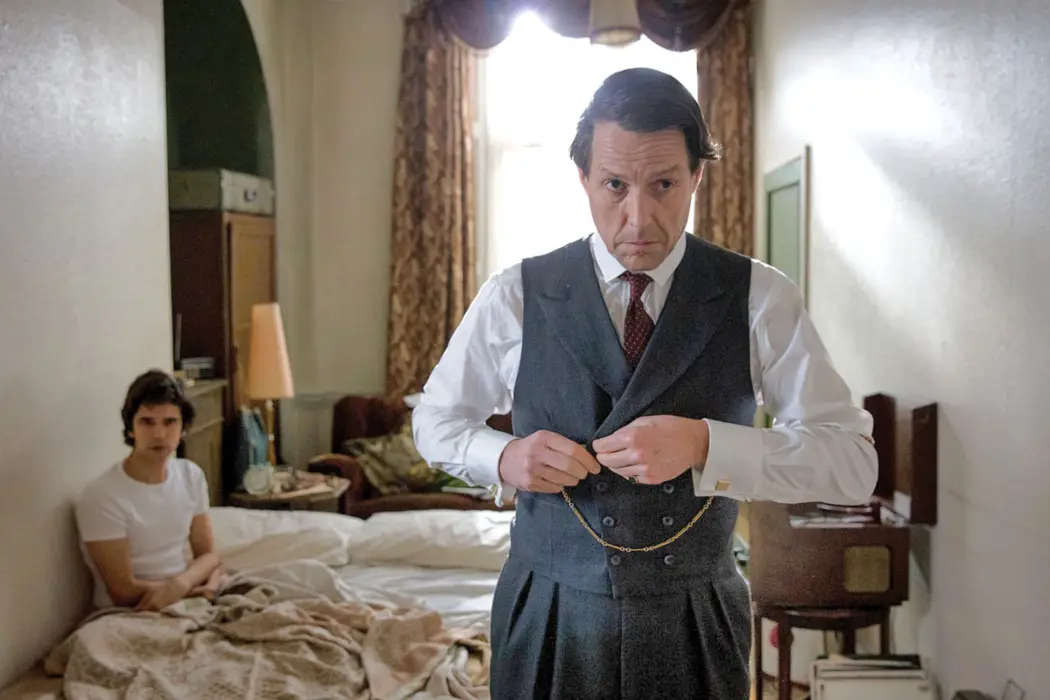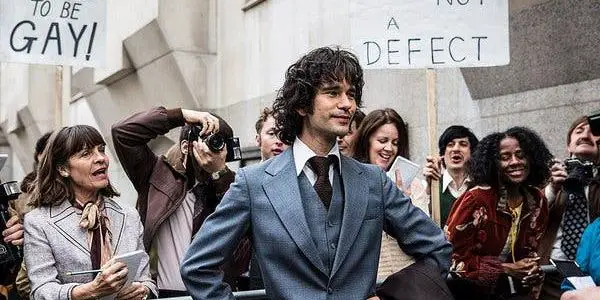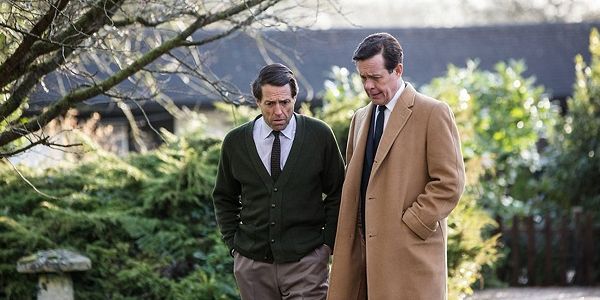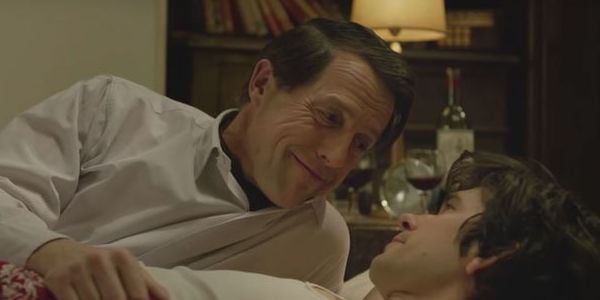Stephen Frears & The Simplicity Of A VERY ENGLISH SCANDAL

Andrew Emerson is a University of Chicago student. His high…
In recent years, many of the works of English director Stephen Frears have suffered from two major flaws. First, in films like Philomena, Florence Foster Jenkins, and Victoria & Abdul, the most important moments in the narrative were often characterized by heavy-handed messaging. And second, in films like Philomena and Victoria & Abdul, Frears disregarded or downplayed facts that would have complicated his view of history.
Given the rave reviews that it received, you’d think that A Very English Scandal, a miniseries that Frears directed in 2018, broke this unfortunate streak in his recent career. For those who haven’t seen it, the miniseries depicts the relationship between Jeremy Thorpe (Hugh Grant), a popular British politician during the ’60s and ’70s, and Norman Scott (Ben Whishaw), an aggrieved former lover of Thorpe’s. After Thorpe tries but fails to have Scott killed, Scott denounces Thorpe to the police, resulting in a highly publicized trial that precipitates the end of Thorpe’s political career.
In many respects, A Very English Scandal definitely deserved the praise that critics showered upon it. Yet despite its merits, it, too, ultimately falls victim to forms of the two aforementioned problems. To be more precise, several scenes in the show prove needlessly didactic. And the miniseries also offers an incomplete depiction of what it was like to be gay in 20th-century England.
Needless Blatancy
To begin with, A Very English Scandal’s attempts to talk about homophobia often feel blatant. Two scenes, in particular, do a good job of illustrating what this blatancy looks like. In the first, an old MP named Lord Arran (David Bamber) tearfully explains why he’s sponsoring a bill that decriminalizes homosexuality, claiming that gay people are being “murdered” by institutionalized prejudice. In the second, Scott gives an impassioned speech about homophobia during Thorpe’s trial, noting that “all the history books get written with men like me missing.”

In a way, both Arran and Scott’s speeches speak for themselves. As though he didn’t trust us to grasp their significance on our own, however, Frears decides to shoot both of these scenes as close-ups with dark lighting and no background music. By emphasizing the speeches’ “seriousness,” these stylistic choices make both scenes feel preachy and obvious.
What makes these scenes’ blatancy especially upsetting, moreover, is the fact that many other scenes in A Very English Scandal are anything but blatant. Instead of directly discussing homophobia’s terrible consequences, many parts of the miniseries indicate them only obliquely. Specifically, these parts of the miniseries imply criticisms of homophobia by satirizing Thorpe’s extreme obsession with respectability – a concept that, among other things, entails acting as heteronormatively masculine as possible.
When you put all of the scenes in A Very English Scandal together, then, you get a miniseries that’s riven by inconsistencies. For much of the show, Frears attacks homophobia indirectly by skewering traditional English notions of respectability and propriety. But if the scenes with Lord Arran and Scott are any indication, Frears thinks that we need extra help to comprehend the critique of homophobia that he advances through his satire. By including such scenes, Frears not only gives A Very English Scandal an obviousness that the show’s more satirical portions seek to avoid, but he also shows a disregard for the audience’s intelligence.
An Incomplete View of History
Insulting blatancy aside, A Very English Scandal also offers an incomplete view of LGBT history. Generally speaking, the miniseries advances the idea that LGBT life in 20th-century England was inevitably difficult and tragic. Specifically, Frears gives us the impression that gay people were invariably marginalized, unable to have sustained relationships, and either in hiding or in denial vis-à-vis their sexuality.
There’s no one scene that explicitly outlines it, but this dark view of LGBT history emerges in part from how the show’s non-gay characters talk about or deal with homosexuality. For instance, in his aforementioned monologue about institutionalized homophobia, Lord Arran describes how his gay brother committed suicide. Both of Thorpe’s wives react with disgust and anger when they hear rumors concerning Thorpe’s sexuality. A police officer derisively calls Scott “a lying little queer.” And so on.

Above all, Frears’ negative depiction of LGBT history manifests itself in the show’s protagonists, namely the two characters who get by far the most screen time. Thorpe’s affairs with men are invariably transient and emotionally unsatisfying – and in a sign of internalized homophobia, he has trouble acknowledging his sexuality even to himself, to say nothing of his friends and spouses. In a similarly gloomy vein, moreover, Scott is portrayed as a social outcast who initially feels shame at being “infected with the virus of homosexuality.”
By spending so much time portraying tragic stories about gay people, A Very English Scandal advances a bleak depiction of LGBT life in 20th-century England. At the same time, however, it minimizes evidence that could potentially problematize this depiction – specifically, the character of David Holmes (Paul Hilton), Thorpe’s right-hand man in both the miniseries and real life.
As described in the historical novel on which A Very English Scandal is based, after all, Holmes was a successful merchant banker who “never even pretended to be anything other than homosexual.” Furthermore, if Michael Bloch’s biography of Thorpe is any guide, Holmes was also in a long-term relationship with a TV producer named Gerald Hagan – a relationship so stable, in fact, that Holmes reportedly referred to it as a “marriage.”
Since both of these books are primarily interested in Thorpe and Scott, they don’t provide much further detail regarding Holmes, and we can’t draw any definitive conclusions about his life. But based on these nuggets of information, Holmes would apparently upend any uniformly bleak understanding of LGBT life in England. He was unabashedly gay and “married” to another man – and as evidenced by his banking career, those facts seemingly didn’t prevent him from obtaining professional success, either.

What’s disappointing about A Very English Scandal, however, is that it plays down Holmes’ convention-defying story. Frears is hardly unaware of what Holmes was like: in the second episode, Holmes mentions “Gerald” in passing during one conversation, and there’s also a brief shot of the two of them watching TV together. But whereas the miniseries spends a lot of time depicting unhappy gay people, it never expands on these two easily missable allusions to Holmes’ comparatively happy life. It’s almost as though it didn’t want to complicate the downbeat message about LGBT history that it conveys through characters like Thorpe, Scott, and Lord Arran’s brother.
In making this argument, I don’t mean to dismiss the pervasiveness of homophobia in the 20th century. And I recognize that A Very English Scandal is primarily meant to be about Thorpe and Scott, not a right-hand man who doesn’t even have his own Wikipedia page. But it’s nevertheless dismaying that Frears so thoroughly downplays Holmes, who potentially represents an exception to our (and Frears’) conventionally bleak view of LGBT history. While I wouldn’t say this omission is disqualifying, Frears’ depiction of LGBT history feels distorted and incurious because of it.
Conclusion: A Very English Scandal
Like I mentioned earlier, there are definitely things in A Very English Scandal that work well. In particular, just as Judi Dench made Philomena and Victoria & Abdul watchable, the miniseries benefits from excellent lead performances. As Thorpe, Grant makes a monster seem irresistibly suave, while as Scott, Whishaw eloquently expresses the desperation of a man whom very few people seem to respect.
Ultimately, however, even an actress like Dench couldn’t completely make up for Philomena and Victoria & Abdul’s many flaws. And in a similar vein, Grant and Whishaw’s excellent acting can only take A Very English Scandal so far. At various points in the miniseries, Frears lapses into a didacticism that suggests disdain for the audience’s intelligence. And the miniseries’ depiction of LGBT history feels incomplete, ignoring characters who could complicate its somber take on LGBT life. Together, these problems take what could have been a great miniseries and turn it into just another palatable addition to Frears’ filmography.
Do you agree with me? Why or why not? Please share your thoughts in the comments!
Does content like this matter to you?
Become a Member and support film journalism. Unlock access to all of Film Inquiry`s great articles. Join a community of like-minded readers who are passionate about cinema - get access to our private members Network, give back to independent filmmakers, and more.
Andrew Emerson is a University of Chicago student. His high school English teacher once asked him to read a batch of Roger Ebert’s reviews for class, and he’s been fixated on the idea of writing about movies ever since. You can follow his attempts to pursue this obsession at http://filmwatcher.net/.













